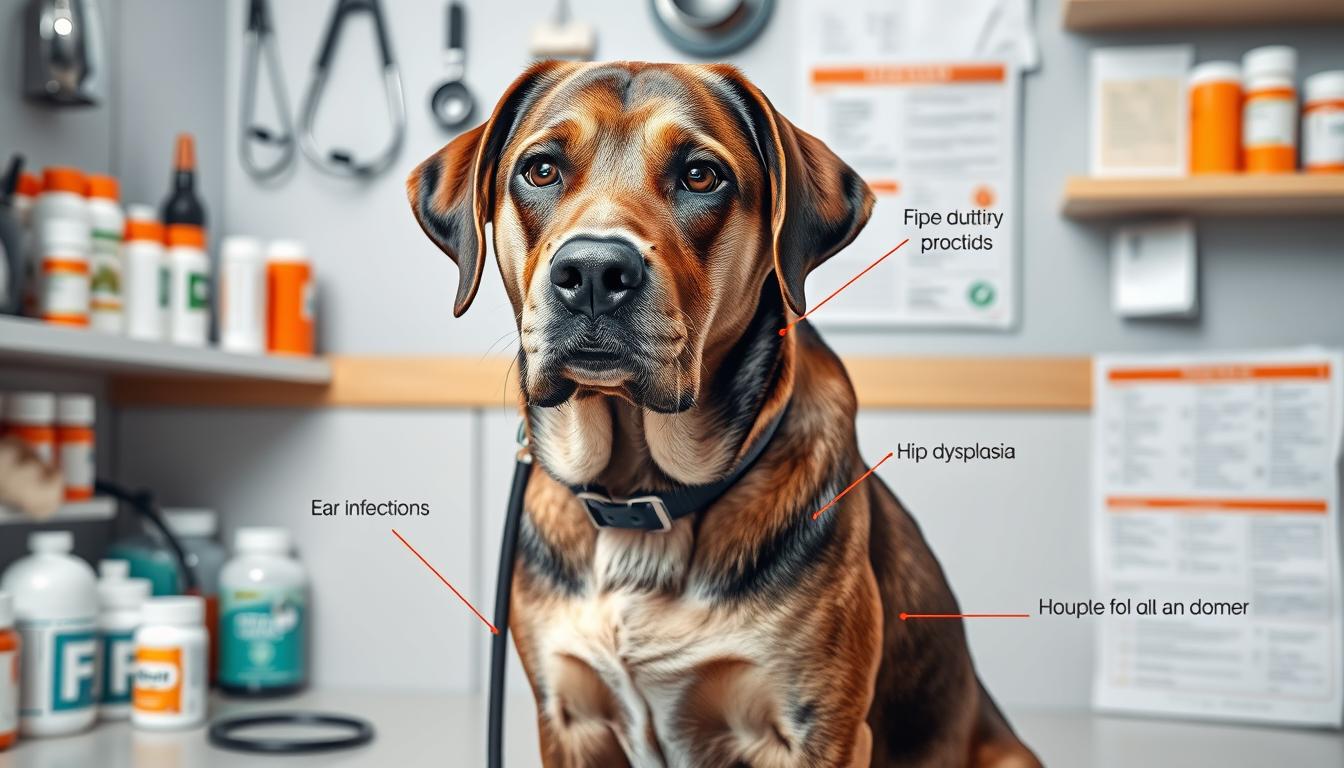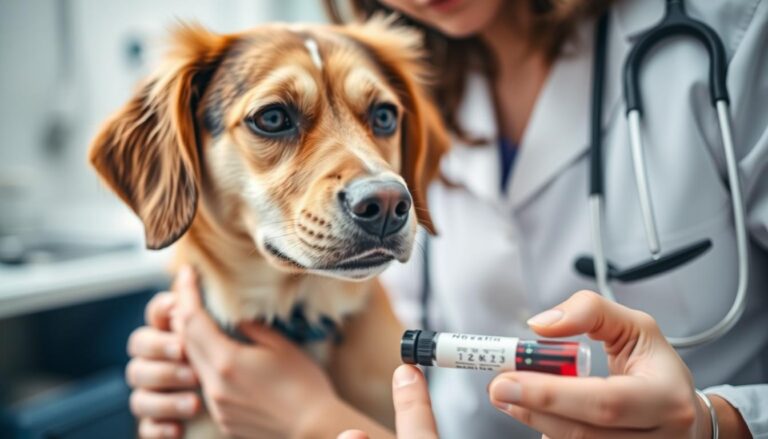Common Labrador Dog Health Problems: Owner’s Guide
Common Labrador Dog Health Problems : Labradors are loved for their friendly nature and love for activity. But, like all breeds, they face health issues that can affect their life quality. It’s important for Labrador owners to know about these health problems. This knowledge helps in keeping your dog happy and healthy.
Table of Contents
Key Takeaways
- Labradors are prone to genetic and age-related health issues like hip and joint problems, eye disorders, and heart disease.
- Good breeding, early detection, and regular vet visits are key to managing Labrador health concerns.
- Regular check-ups, vaccinations, and a balanced diet are crucial for a Labrador’s well-being.
- Labradors often struggle with obesity, so it’s important to manage their weight and keep them active.
- Knowing your Labrador’s health needs is essential for providing the best care and ensuring they thrive.
Understanding Labrador Breed Health Predispositions
Labradors are loved and popular pets. They are generally healthy. But, their genetics and breeding history can lead to health issues. Knowing this helps keep Labradors healthy for their whole life.
Genetic Factors Affecting Labrador Health
Labradors can get hip and elbow dysplasia, exercise-induced collapse, and progressive retinal atrophy. These labrador dog diseases come from their genetics. This is because of selective breeding over many generations.
Impact of Breeding History on Health
Labradors are very popular, leading to a lot of breeding. But, this isn’t always done with health in mind. Bad breeding, focusing on looks over health, makes some problems worse in the breed.
Age-Related Health Considerations
- Older Labradors may get joint problems like arthritis.
- Senior Labradors can also face heart and cardiovascular issues. Regular vet visits are key.
- Labradors may also experience cognitive decline and other age-related problems as they get older.
Knowing about genetic, breeding, and age-related health issues helps Labrador owners. They can take steps to keep their pets healthy. This way, they can tackle problems early on.
Hip Dysplasia and Joint Problems in Labradors
Labradors are known for their friendly nature and endless energy. However, their joint health is a big concern. Labrador joint problems, especially labrador hip dysplasia, are common and need attention from owners.
Hip dysplasia is a genetic issue where the hip joint doesn’t form right. This causes pain, arthritis, and mobility problems. It’s common in Labradors because of their size and fast growth during puppyhood.
- Symptoms of hip dysplasia in Labradors include trouble standing up, not wanting to exercise, and pain when moving the hip.
- Labradors can also face elbow dysplasia, osteoarthritis, and other joint issues.
There are ways to reduce the risk and manage these joint problems. Good nutrition, controlled exercise, and keeping a healthy weight are key. Regular vet visits and early action can help catch and treat issues early.
“Careful management of Labrador joint health is essential for ensuring these active dogs can enjoy a happy, pain-free life.”
Understanding labrador joint problems and labrador hip dysplasia helps owners take steps to keep their Labradors comfortable and healthy.
Identifying and Managing Labrador Dog Health Problems
As a Labrador owner, it’s important to watch your dog’s health closely. Recognizing early signs and taking action can prevent and manage common health issues. Here are some tips to help you.
Early Warning Signs to Watch For
Keep an eye on your Labrador’s behavior and physical changes. This can help spot health problems early. Look out for:
- Lethargy or decreased activity levels
- Changes in appetite or weight
- Persistent coughing or sneezing
- Limping or difficulty moving
- Skin irritations or changes in coat condition
When to Seek Veterinary Care
If you see any concerning symptoms, see your vet right away. They can check your dog, find the problem, and treat it. Early treatment is key to your dog’s health.
Preventive Health Measures
Preventive steps are crucial for your Labrador’s health. Consider these:
- Regular vet visits and vaccinations
- A healthy diet and exercise
- Grooming and dental care to prevent infections
- Watch for signs of joint, eye, or ear problems
- Keep your Labrador at a healthy weight
Being proactive and vigilant can help your Labrador live a long, healthy life. Early detection and care are essential for managing health problems.
Obesity and Weight Management Challenges
Labradors often face obesity due to their big appetite and love for food. Labrador obesity risks can harm their health and happiness. It’s important to understand why and how to manage their weight.
Labradors are genetically inclined to love food and have a slower metabolism. Their friendly nature and strong bond with owners can also lead to too many treats. This makes their obesity problem worse.
| Health Risks Associated with Labrador Obesity | Potential Consequences |
|---|---|
| Musculoskeletal problems | Increased strain on joints, leading to arthritis and mobility issues |
| Cardiovascular disease | Elevated risk of heart conditions and decreased overall cardiovascular function |
| Metabolic disorders | Increased likelihood of diabetes and other endocrine-related health problems |
| Respiratory issues | Difficulty breathing and reduced exercise tolerance |
| Reduced lifespan | Obesity can significantly shorten a Labrador’s expected lifespan |
To fight labrador obesity risks, owners need to team up with their vet. They should create a weight management plan. This might include:
- Using a calorie-controlled diet with high-quality, nutrient-rich food
- Increasing exercise and physical activity
- Regularly checking body condition and weight
- Limiting treats and using non-food rewards
- Making sure the dog’s environment promotes activity
By tackling labrador obesity risks and being proactive about weight management, owners can ensure their Labradors live longer, healthier lives.
Common Eye Conditions Affecting Labradors
Labradors are a popular breed and can get many eye problems. These issues can hurt their vision and health. It’s key for owners to know about these conditions, their causes, and treatments to keep their dogs healthy.
Progressive Retinal Atrophy
Progressive retinal atrophy (PRA) is a disease that harms the retina. It’s a genetic disorder that makes vision fade away. It starts with night blindness and can lead to total blindness. Early detection and genetic tests can help owners manage this condition.
Cataracts and Treatment Options
Cataracts cloud the lens of the eye. They can happen as dogs age, but some Labradors get them younger. Cataract surgery can often fix this, giving dogs back their sight.
Regular Eye Care Routine
- Take your dog for regular eye checks to catch problems early.
- Know the signs of eye issues, like redness or changes in behavior.
- Keep your dog healthy with a good diet and exercise for better eye health.
Knowing about labrador eye conditions and caring for your dog’s eyes can help them see better. This keeps them happy and healthy.
Ear Infections and Respiratory Issues
Labrador Retrievers often face health problems like ear infections and breathing issues. These can stem from allergies, ear shape, and the environment. Knowing the causes and signs of these conditions is key for keeping Labradors healthy.
Recognizing the Signs of Ear Infections
Ear infections, or otitis, are common in Labradors. Their floppy ears and allergies make them prone to infections. Look out for these signs:
- Excessive head shaking or ear scratching
- Redness, swelling, or discharge in the ear canal
- Foul odor emanating from the ears
- Pain or discomfort when the ears are touched
Managing Respiratory Concerns
Labradors may also have breathing problems, like allergies or chronic conditions. Watch for these symptoms:
- Snorting, sneezing, or wheezing
- Difficulty breathing, especially during physical activity
- Persistent coughing or gagging
- Lethargy or reduced exercise tolerance
Seeing a vet quickly is crucial for diagnosing and treating these issues. This ensures the Labrador’s comfort and health.
| Condition | Symptoms | Treatment |
|---|---|---|
| Ear Infections | Excessive head shaking or ear scratching Redness, swelling, or discharge in the ear canal Foul odor emanating from the ears Pain or discomfort when the ears are touched | Topical ear medications Antibiotics or antifungal treatments Cleaning and maintaining ear hygiene |
| Respiratory Issues | Snorting, sneezing, or wheezing Difficulty breathing, especially during physical activity Persistent coughing or gagging Lethargy or reduced exercise tolerance | Antihistamines or decongestants Bronchodilators or corticosteroids Environmental management (e.g., reducing allergens) Surgical interventions (for severe cases) |
By being alert and addressing labrador ear infections and breathing problems, owners can help their Labradors live a happy, healthy life.
Heart and Cardiovascular Health Concerns
Labradors are known for their friendly nature and love for activity. But, they can face health issues with their heart and blood vessels. It’s important to know about these problems and take steps to keep them healthy.
Heart Disease Prevention
Labradors are at risk for heart diseases like dilated cardiomyopathy. This can lead to heart failure. Regular vet visits and early detection are key. Owners should work with their vets to create a prevention plan. This might include medicine, lifestyle changes, and regular check-ups.
Exercise and Cardiovascular Health
Keeping Labradors active is vital for their heart health. Activities like brisk walks, swimming, or playtime strengthen their hearts. But, owners need to watch their dog’s exercise level. It should match their age, fitness, and health.
Dietary Considerations
| Nutrient | Importance for Labrador Heart Health |
|---|---|
| Omega-3 fatty acids | Help reduce inflammation and support heart function |
| Antioxidants | Protect against cellular damage and support overall cardiovascular health |
| Fiber | Aids in maintaining a healthy weight, which is crucial for heart health |
Adding these nutrients to a Labrador’s diet helps prevent heart problems. Owners should talk to their vets about the best diet for their dog. This can be through special dog food or supplements.
Understanding Labradors’ heart health issues helps owners keep them happy and healthy. Regular vet visits, the right exercise, and a good diet are key. These steps help ensure Labradors live long, active lives.
Skin Conditions and Allergies in Labradors
Labrador Retrievers often face skin issues and allergies. These problems can affect their health and happiness. It’s important for owners to know about these common problems to care for their dogs well.
Atopic dermatitis is a common skin issue in Labradors. It’s a chronic condition caused by environmental allergens. Symptoms include intense itching, redness, and hot spots. Treatment, diet changes, and controlling the environment can help manage these symptoms.
Labradors can also get bacterial or fungal skin infections. These infections cause skin irritation, lesions, and hair loss. It’s crucial to get a vet’s help quickly to stop these problems from getting worse.
| Skin Condition | Symptoms | Potential Causes | Treatment Options |
|---|---|---|---|
| Atopic Dermatitis | Intense itching, redness, hot spots | Environmental allergens | Veterinary-approved medications, diet modifications, environmental control |
| Bacterial/Fungal Infections | Skin irritation, lesions, hair loss | Bacterial or fungal overgrowth | Antibiotics, antifungal medications, topical treatments |
Good grooming and hygiene can help prevent these issues. Regular baths, brushing, and ear cleaning are key. By being proactive, owners can keep their Labradors’ skin and coats healthy and comfortable.
“Maintaining your Labrador’s skin health is crucial for their overall well-being and happiness.”
Preventive Care and Regular Health Screening
Keeping your Labrador healthy is very important. Early detection of health issues is key to a long, happy life. This guide will help you with vaccinations, health checks, and dental care.
Vaccination Schedule
Vaccinations are crucial for your Labrador’s health. The schedule includes:
- Puppy shots: Start at 6-8 weeks, with boosters every 3-4 weeks until 16 weeks
- Core vaccines: Distemper, parvovirus, adenovirus, coronavirus, and rabies
- Non-core vaccines: Leptospirosis, Bordetella, and canine influenza, depending on your Labrador’s lifestyle
Routine Health Checks
Regular vet visits are vital for your Labrador’s health. Aim for annual check-ups that may include:
- Physical examination
- Bloodwork and other tests
- Heartworm and flea/tick prevention
- Talks on diet, exercise, and behavior
Dental Care Requirements
Dental health is important for your Labrador’s overall health. Start a dental care routine with:
- Teeth brushing at home
- Professional cleanings and dental exams
- Dental chews and toys for oral hygiene
By focusing on preventive care and regular health checks, you can prevent health problems. This way, your Labrador can live a long, healthy life with you.
Conclusion
Understanding labrador breed health concerns is key to your dog’s happiness. Knowing about genetic issues, age-related problems, and common health issues like hip dysplasia and obesity is important. This knowledge helps owners protect their pets.
Regular vet visits, preventive care, and watching for early signs can greatly improve your Labrador’s life. Building a strong bond with your vet and staying updated on your dog’s health needs is crucial. It helps keep your Labrador healthy and happy for years to come.
As you care for your Labrador, always put their health first. Be alert to any health issues and work with your vet to keep your dog happy and healthy. This way, your Labrador will always be a cherished part of your family.
FAQ
What are the most common health problems in Labrador Retrievers?
Labrador Retrievers face many health issues. These include hip and elbow dysplasia, obesity, eye problems, ear infections, and skin allergies. Knowing about these problems is key for keeping your Labrador healthy.
How can I prevent hip and joint problems in my Labrador?
Keeping your Labrador at a healthy weight is important. Regular exercise and good nutrition also help. Don’t forget to take them to the vet for check-ups to catch any joint issues early.
What are the signs of obesity in Labradors, and how can I help my Labrador maintain a healthy weight?
Labradors can easily get too fat because they love to eat. Look for a rounded belly, trouble moving, and being very tired. To keep them slim, control their food, feed them well, and make sure they get enough exercise.
What common eye conditions affect Labradors, and how can I ensure my Labrador’s eye health?
Labradors often get eye problems like progressive retinal atrophy and cataracts. It’s vital to take them for eye exams and catch these issues early. Also, keep up with a good eye care routine to help them see their best.
How can I prevent and manage ear infections in my Labrador?
Ear infections are common in Labradors because of their floppy ears and allergies. Clean their ears often, watch for signs of infection, and treat any allergies to keep their ears healthy.
What are the common heart and cardiovascular health concerns for Labradors, and how can I support their heart health?
Labradors might have heart issues. Keeping them at a healthy weight, exercising them regularly, and feeding them well helps their heart. Also, regular vet visits are important to check for heart problems.
How can I keep my Labrador’s skin and coat healthy, and what are the common skin conditions I should be aware of?
Labradors can get skin problems like allergies and hot spots. Good grooming, the right diet, and treating allergies can help. If skin issues don’t go away, talk to a vet.
What is the recommended vaccination schedule and routine health screening for Labradors?
Labradors need a full vaccination schedule to stay safe from diseases. Regular vet visits, including exams and tests, are key to keeping them healthy all their lives.







